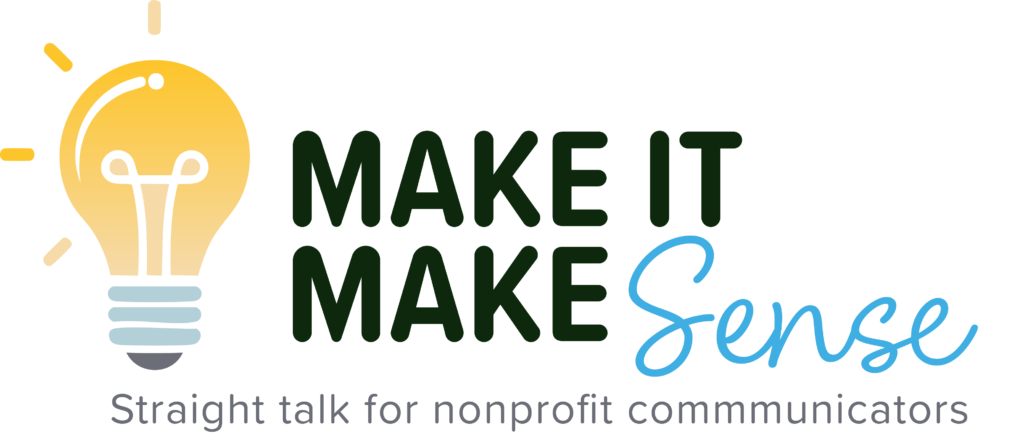Listen up, nonprofit communicators. It’s 2025, and we’re still out here trying to thread the needle between not offending funders and actually standing for something. It’s exhausting, it’s confusing, and it might be doing more harm than good.
If your nonprofit relies on (or would like to have) money from public sources, you’ve probably heard “maybe we should scale back the rhetoric on this one” a more than few times. “How can we say this without ruffling feathers?”
And you bang your head on your desk groaning “these are proven best practices!”
What we in the public service world know is that helping people requires money. And money comes with politics. And politics comes with risk. In an overwhelmingly divisive political climate, using certain buzzwords or even the appearance of taking a stance can cost your organization critical partners, donors, and public funding (that can sometimes be cut off at the discretion of a single elected official). So we hedge our messages, including the stuff we know to be fact. Because even facts aren’t trusted anymore.
Is It Worth It?
Taking a clear stance on important issues and best practices doesn’t just risk alienating some of your financial backers—it also attracts new ones. Today’s donors, especially the younger ones, and values-driven philanthropic organizations aren’t just looking to write checks. They’re looking to invest in organizations doing the work that aligns with their beliefs.
Speaking boldly about systemic injustice or proven methodologies can resonate deeply with people who have been waiting for someone to say what everyone else has been tip-toeing around. When you lead with courage and clarity, you might lose some lukewarm backers, but you’ll gain passionate advocates that will be ride-or-die for your cause.
The (Supposed) Upsides to Neutrality
Let’s be fair—there are some legit reasons why nonprofits try to stay politically neutral, especially in the human services space where you’re trying to serve diverse communities that will be impacted by every lost dollar. I know the general tone of this article is urging you to be true to your beliefs and not shy away from facts and best practices just to appease some amorphous concept of an angry mob. But it’s important to weigh the threat of political forces to your organization and—more importantly—the real people you serve. So here are a few reasons you may want to consider political neutrality…
You won’t alienate your donors or partners. In theory, everyone from libertarian tech bros to progressive social justice warriors can unite around feeding children and supporting veterans. Keeping it apolitical casts a wider net. You’re also more likely to see your public funding sustain across changing administrations.
Keep your status clean. There are legal restrictions on political activity for nonprofits. Depending on the type of organization you belong to, you may not be able to endorse candidates, for instance. You can find a lot of value in just talking about boots-on-the-ground work, analyzing irrefutable data (someone will probably try to refute it anyway), and focusing on people over policy. Just don’t confuse nonpartisan with nonspecific.
You can be a neutral convener. Someone’s gotta be Switzerland, right? Political neutrality can make your organization a safe space for all parties to convene. The guy in the middle often gets to play mediator, and when you bring diametrically opposed parties together, you’ve got some boasting to do.
Take a Stand to Stand Out
Neutrality isn’t noble. Sometimes it’s just a branding decision masquerading as ethics. In today’s America—fractured, flooded with disinformation, and fueled by what we can sell to the flyover states—not taking a stand is taking a stand (for avoiding the hard stuff).
If you’re not naming the systemic causes behind the issues you’re trying to solve—poverty, homelessness, health disparities, systemic racism—then you’re just handing out band-aids and calling it a strategy. Policy created these problems. Policy can fix them. And that means talking politics.
Neutrality often means silence. Trying to please everybody is a Sisyphean task at best. By the fifteenth draft, many nonprofit leaders end up shrugging their shoulders and saying “someone else can tackle this one.” Legislation impacts your clients every single day. If you’re afraid to say this policy harms our people, you’re letting other voices control the narrative—and probably the outcome.
Everyone sees through it. Your employees, clients, and partners know what’s up. They see you sitting on your hands, even though you know the right thing to do. In fact, you might be the only org that can adequately represent the heart of a problem. You might keep some squeamish donors with your middle-of-the-road public image, but the people who are turning to you to represent their long-term needs will go to the nonprofit that is saying something real.
You’re leaving money on the table. It always comes back to money, doesn’t it? In the short term, you might lose a few donors who liked having their name on your wall and publications. The ones that use their donations to feel good about themselves more than make a meaningful difference.
So What’s the Play?
I’m not saying go full rogue and start live-tweeting from protest marches (unless that’s your thing… in which case: carry on). But if you’re serving communities impacted by unjust systems, your messages should reflect that reality.
Some things you can do:
- Use values-based language. Frame your messages around equity, dignity, and human rights—not just outputs and outcomes. Offer policy recommendations based on current conditions, real data, and what your clients need to thrive, rather than pointing at specific legislation or some lawmaker’s latest press release. Your audience can put two and two together, and you’ll be seen as a thought leader.
- Call out policy without calling out parties. Say “We oppose this bill because it increases barriers to equitable housing,” not “Senator Whats-His-Face wants to put families on the street.”
- Educate your board. Most of the time, “We can’t say that” really means “We don’t want to deal with the emails.” Equip your board with talking points that scream solidarity with the mission and any board member worth their salt will rise to the occasion. Those who don’t probably aren’t the right fit for your cause anyway.
- Listen to your people. If your staff and community want you to speak up. Represent them, even if you’re worried it’s going to cost you something. The people you serve know what they need, and they probably need it more than you need that iffy donor.
Final Thoughts
Being neutral in 2025 is just code for being comfortable. But comfort won’t solve the housing crisis. It won’t undo systemic racism. It won’t help a single mother navigate a health system designed to fail her.
It also won’t open the door for new donors, clients, and employees who are just waiting for someone to say something that matters.
So the next time your team is huddled around a whiteboard debating whether a statement is too political, ask yourself: Who are we protecting—and who are we leaving behind?




